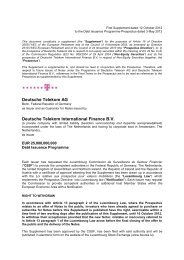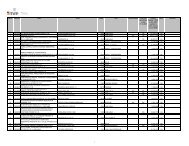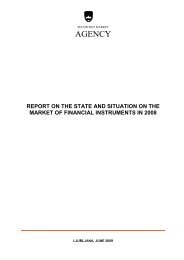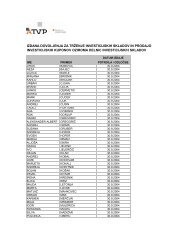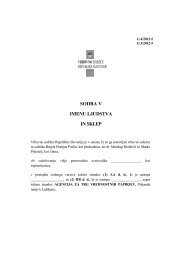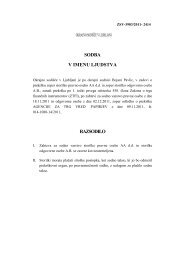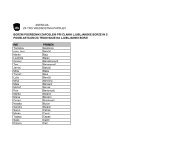Prospectus-Final (clean) - Malta Financial Services Authority
Prospectus-Final (clean) - Malta Financial Services Authority
Prospectus-Final (clean) - Malta Financial Services Authority
- No tags were found...
Create successful ePaper yourself
Turn your PDF publications into a flip-book with our unique Google optimized e-Paper software.
In 2010, T-Systems substantially expanded business with customers outside the Group. The operatingsegment generated net revenue of EUR 6.4 billion, a 5.4% increase when compared with 2009. Thispositive development was primarily attributable to Deutsche Telekom's Computing & Desktop <strong>Services</strong>business, in which many of Deutsche Telekom's customers are opting for cloud services. In addition,Deutsche Telekom's net revenue increase is also attributable to growth at its Systems Integrationbusiness, particularly with application management and development. The increase in net revenuewas partially offset by developments in Deutsche Telekom's telecommunication business, whererevenue again declined because of intense price pressure.- Adjusted EBITDAIn 2011, the primary reasons for the decline of adjusted EBITDA from the Systems Solutions operatingunit included increased contract-related expenses, such as the migration of customer infrastructure toT-Systems' operational business, and increases in start-up expenses related to focus areas, such asintelligent networks, energy, healthcare and connected cars. Adjusted EBITDA was also negativelyaffected by measures to improve competitiveness, such as the roll-out and expansion of an internalnearshore and offshore delivery network and staff restructuring measures. Savings generated byDeutsche Telekom's restructuring and efficiency enhancement programs did not offset this increase incosts.In 2010, the increase in adjusted EBITDA was primarily attributable to the increase in revenues. Thisincrease was partially offset by the higher cost of goods and services purchased as a result of start-upcosts in connection with new contracts.In 2012, Deutsche Telekom expects adjusted EBITDA to increase slightly. As noted above, theinternal IT activities of Deutsche Telekom will be consolidated in the Systems Solutions operatingsegment from mid-2012. Adjusted EBITDA expectations are based on the assumption of anunchanged consolidation structure that does not yet include this consolidation of IT activities.- Profit(loss) from OperationsIn 2011, Deutsche Telekom experienced a loss from operations compared to a profit from operationsin 2010. This change is attributable not only to effects of increased expenses related to contracts, butalso to increased depreciation, amortisation and impairment losses following capital expenditure toexpand the business in 2010. Deutsche Telekom's restructuring and efficiency enhancement programwas not able to fully offset this development.The increase in profit from operations in 2010 resulted from lower depreciation and amortisation owingto the extension, on economic grounds, of the useful lives of several assets, such as highperformanceservers.- Cash CapexDeclines in cash capex were primarily due to T-Systems' completion of a project to build out itscomputing platform in 2010. Measures to increase efficiency, such as Deutsche Telekom's increasingstandardisation of ICT platforms, also reduced the need for capital expenditures. Investments mainlyfocused on customer orders and the expansion of new multipurpose platforms, such as for cloudservices and De-Mail.The increase in cash capex in 2010 resulted from an expansion of T-Systems' computing platform andinvestments related to new contracts. The addition of assets taken on under new contracts offset thepositive effects from efficiency enhancement measures, such as the increased standardisation of ICTplatforms.Group Headquarters & Shared <strong>Services</strong>Group Headquarters & Shared <strong>Services</strong> comprises all Group units that cannot be allocated directly toone of the four operating segments. Group Headquarters is responsible for strategic and crosssegmentmanagement functions. Shared <strong>Services</strong> is responsible for all other operating functions notdirectly related to the operating segments' core business activities and primarily provides services inGermany. Shared <strong>Services</strong> also includes Real Estate <strong>Services</strong> and DeTeFleet<strong>Services</strong> GmbH, a fullserviceprovider of fleet management and mobility services. Vivento is responsible for providingemployees with new employment opportunities as part of Deutsche Telekom's workforce restructuringprogram.99




